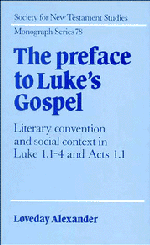Book contents
- Frontmatter
- Contents
- Acknowledgements
- Abbreviations
- 1 The Lucan preface: questions and assumptions
- 2 On the beginnings of books
- 3 Historical prefaces
- 4 Scientific prefaces: origins and development
- 5 Scientific prefaces: structure, content and style
- 6 Luke's preface
- 7 Prefaces in hellenistic Jewish literature
- 8 The social matrix of Luke's preface
- 9 The appropriate form of words for the occasion
- Appendix A Structural analysis of Luke 1.1–4 and selected scientific prefaces
- Appendix B Bibliographical notes on scientific prefaces
- Select bibliography
- Index of scientific authors
- Index of ancient authors and names
- Index of modern authors
- Index of subjects
6 - Luke's preface
Published online by Cambridge University Press: 15 October 2009
- Frontmatter
- Contents
- Acknowledgements
- Abbreviations
- 1 The Lucan preface: questions and assumptions
- 2 On the beginnings of books
- 3 Historical prefaces
- 4 Scientific prefaces: origins and development
- 5 Scientific prefaces: structure, content and style
- 6 Luke's preface
- 7 Prefaces in hellenistic Jewish literature
- 8 The social matrix of Luke's preface
- 9 The appropriate form of words for the occasion
- Appendix A Structural analysis of Luke 1.1–4 and selected scientific prefaces
- Appendix B Bibliographical notes on scientific prefaces
- Select bibliography
- Index of scientific authors
- Index of ancient authors and names
- Index of modern authors
- Index of subjects
Summary
Introduction
We are now in a position to return to the classification of Luke's preface. As our discussion of historical prefaces in chapter 3 has demonstrated, there are difficulties with the long-standing academic assumption that Luke's opening verses are to be classified with the prefaces of the Greek historians. Luke's single-sentence preface is far shorter than even the briefest historical preface. Historical prefaces are expansive in their discussions of methodology and sources, and in their treatment of such standard topoi as the importance of the subject-matter and the usefulness of history: Luke's brief and allusive introduction is scarcely comparable. Luke does not present his own name, as was normal with the Greek historians. The address to Theophilus runs counter to the conventions of historiography, which eschewed dedication: historians liked to think of their work, in Thucydides' phrase, as ‘a possession for all time’ (Thuc. I 22.4), not as a time-bound communication to an individual. And Luke's style, though unusual by New Testament standards, hardly reaches the rhetorical heights of hellenistic historiography, where stylistic and topical variatio were central concerns.
None of these factors, taken individually is decisive. It would be absurd to pretend that we could prove that Luke was not at least trying to write a preface in the manner of the historians: if he failed, he would not be the only one, as Lucian's How to Write History shows.
- Type
- Chapter
- Information
- The Preface to Luke's Gospel , pp. 102 - 146Publisher: Cambridge University PressPrint publication year: 1993

